Research Methods in Business
VerifiedAdded on 2020/01/28
|12
|3645
|101
Literature Review
AI Summary
This assignment delves into the theoretical and methodological aspects of conducting effective research within businesses like tourism, hospitality, and event management. It emphasizes various qualitative and quantitative methods for collecting data and information pertinent to these industries. The document provides researchers with guidelines for conducting impactful studies in this field.
Contribute Materials
Your contribution can guide someone’s learning journey. Share your
documents today.

Report
1
1
Secure Best Marks with AI Grader
Need help grading? Try our AI Grader for instant feedback on your assignments.
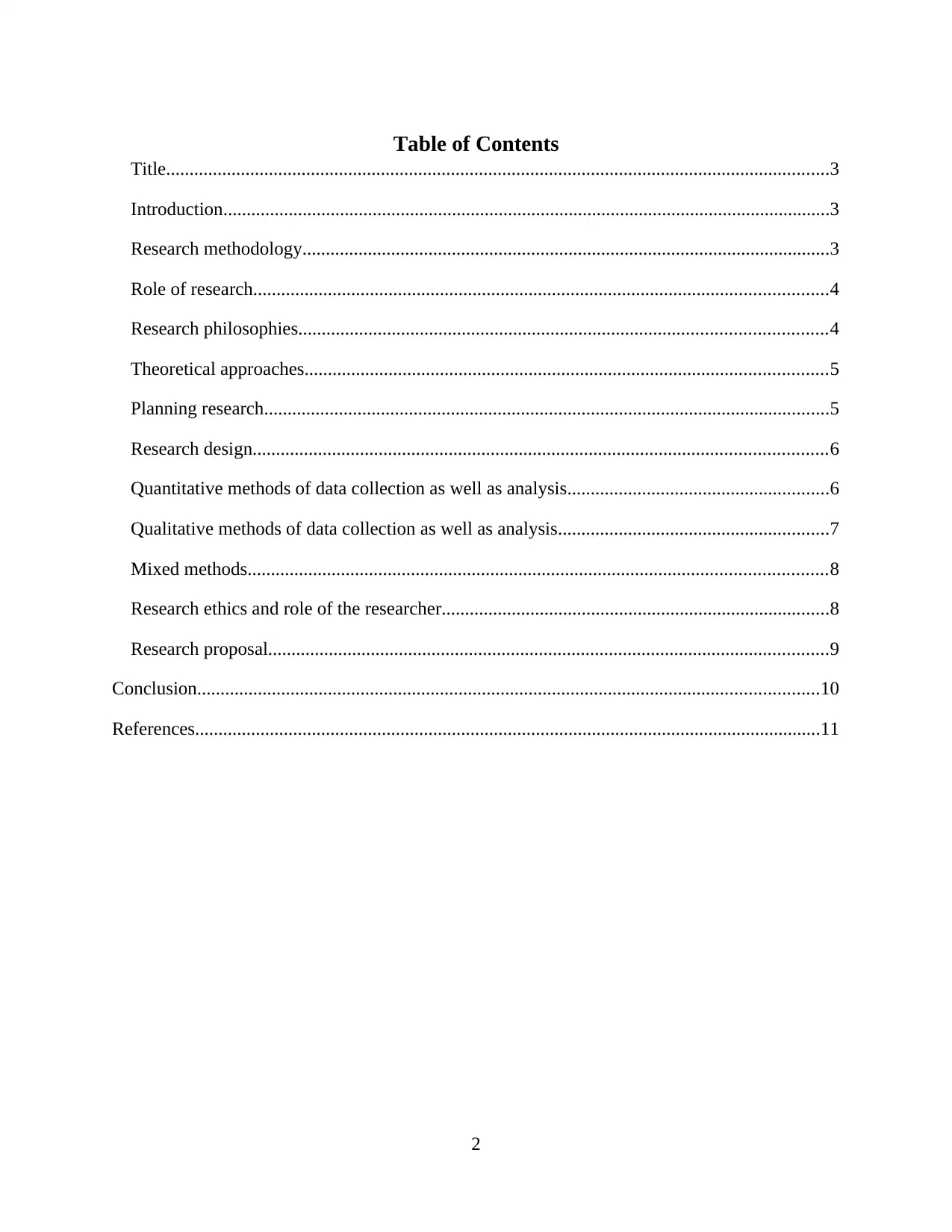
Table of Contents
Title..............................................................................................................................................3
Introduction..................................................................................................................................3
Research methodology.................................................................................................................3
Role of research...........................................................................................................................4
Research philosophies.................................................................................................................4
Theoretical approaches................................................................................................................5
Planning research.........................................................................................................................5
Research design...........................................................................................................................6
Quantitative methods of data collection as well as analysis........................................................6
Qualitative methods of data collection as well as analysis..........................................................7
Mixed methods............................................................................................................................8
Research ethics and role of the researcher...................................................................................8
Research proposal........................................................................................................................9
Conclusion.....................................................................................................................................10
References......................................................................................................................................11
2
Title..............................................................................................................................................3
Introduction..................................................................................................................................3
Research methodology.................................................................................................................3
Role of research...........................................................................................................................4
Research philosophies.................................................................................................................4
Theoretical approaches................................................................................................................5
Planning research.........................................................................................................................5
Research design...........................................................................................................................6
Quantitative methods of data collection as well as analysis........................................................6
Qualitative methods of data collection as well as analysis..........................................................7
Mixed methods............................................................................................................................8
Research ethics and role of the researcher...................................................................................8
Research proposal........................................................................................................................9
Conclusion.....................................................................................................................................10
References......................................................................................................................................11
2
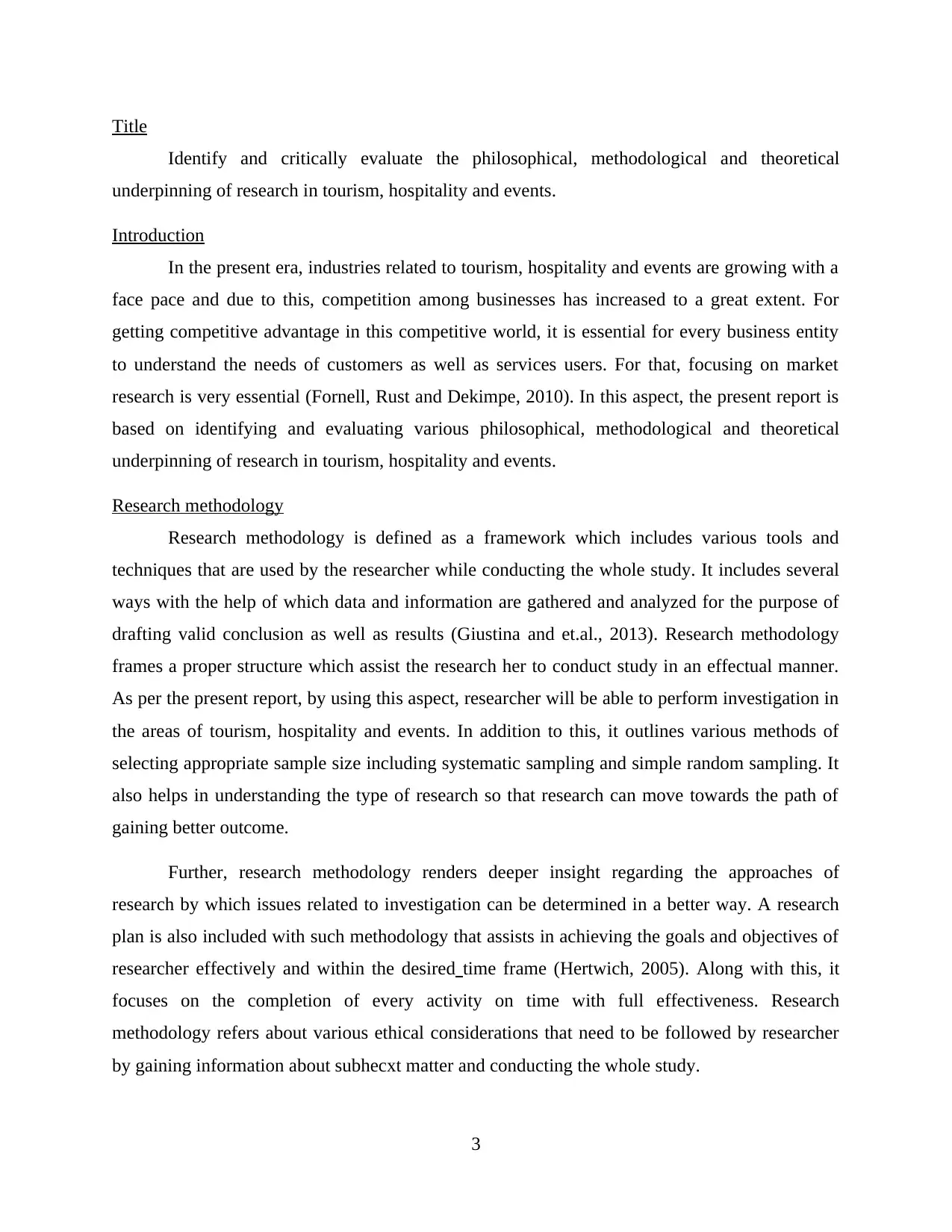
Title
Identify and critically evaluate the philosophical, methodological and theoretical
underpinning of research in tourism, hospitality and events.
Introduction
In the present era, industries related to tourism, hospitality and events are growing with a
face pace and due to this, competition among businesses has increased to a great extent. For
getting competitive advantage in this competitive world, it is essential for every business entity
to understand the needs of customers as well as services users. For that, focusing on market
research is very essential (Fornell, Rust and Dekimpe, 2010). In this aspect, the present report is
based on identifying and evaluating various philosophical, methodological and theoretical
underpinning of research in tourism, hospitality and events.
Research methodology
Research methodology is defined as a framework which includes various tools and
techniques that are used by the researcher while conducting the whole study. It includes several
ways with the help of which data and information are gathered and analyzed for the purpose of
drafting valid conclusion as well as results (Giustina and et.al., 2013). Research methodology
frames a proper structure which assist the research her to conduct study in an effectual manner.
As per the present report, by using this aspect, researcher will be able to perform investigation in
the areas of tourism, hospitality and events. In addition to this, it outlines various methods of
selecting appropriate sample size including systematic sampling and simple random sampling. It
also helps in understanding the type of research so that research can move towards the path of
gaining better outcome.
Further, research methodology renders deeper insight regarding the approaches of
research by which issues related to investigation can be determined in a better way. A research
plan is also included with such methodology that assists in achieving the goals and objectives of
researcher effectively and within the desired time frame (Hertwich, 2005). Along with this, it
focuses on the completion of every activity on time with full effectiveness. Research
methodology refers about various ethical considerations that need to be followed by researcher
by gaining information about subhecxt matter and conducting the whole study.
3
Identify and critically evaluate the philosophical, methodological and theoretical
underpinning of research in tourism, hospitality and events.
Introduction
In the present era, industries related to tourism, hospitality and events are growing with a
face pace and due to this, competition among businesses has increased to a great extent. For
getting competitive advantage in this competitive world, it is essential for every business entity
to understand the needs of customers as well as services users. For that, focusing on market
research is very essential (Fornell, Rust and Dekimpe, 2010). In this aspect, the present report is
based on identifying and evaluating various philosophical, methodological and theoretical
underpinning of research in tourism, hospitality and events.
Research methodology
Research methodology is defined as a framework which includes various tools and
techniques that are used by the researcher while conducting the whole study. It includes several
ways with the help of which data and information are gathered and analyzed for the purpose of
drafting valid conclusion as well as results (Giustina and et.al., 2013). Research methodology
frames a proper structure which assist the research her to conduct study in an effectual manner.
As per the present report, by using this aspect, researcher will be able to perform investigation in
the areas of tourism, hospitality and events. In addition to this, it outlines various methods of
selecting appropriate sample size including systematic sampling and simple random sampling. It
also helps in understanding the type of research so that research can move towards the path of
gaining better outcome.
Further, research methodology renders deeper insight regarding the approaches of
research by which issues related to investigation can be determined in a better way. A research
plan is also included with such methodology that assists in achieving the goals and objectives of
researcher effectively and within the desired time frame (Hertwich, 2005). Along with this, it
focuses on the completion of every activity on time with full effectiveness. Research
methodology refers about various ethical considerations that need to be followed by researcher
by gaining information about subhecxt matter and conducting the whole study.
3
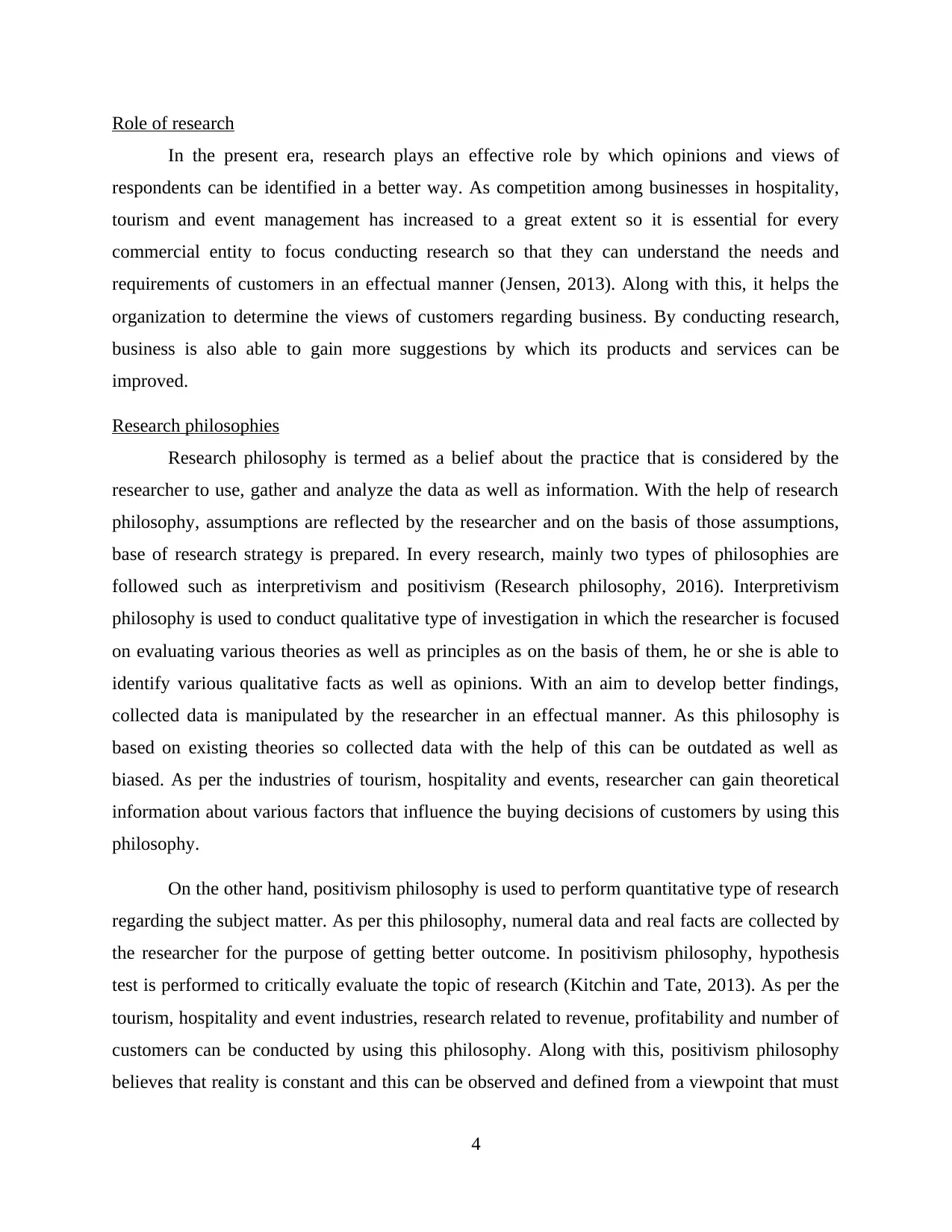
Role of research
In the present era, research plays an effective role by which opinions and views of
respondents can be identified in a better way. As competition among businesses in hospitality,
tourism and event management has increased to a great extent so it is essential for every
commercial entity to focus conducting research so that they can understand the needs and
requirements of customers in an effectual manner (Jensen, 2013). Along with this, it helps the
organization to determine the views of customers regarding business. By conducting research,
business is also able to gain more suggestions by which its products and services can be
improved.
Research philosophies
Research philosophy is termed as a belief about the practice that is considered by the
researcher to use, gather and analyze the data as well as information. With the help of research
philosophy, assumptions are reflected by the researcher and on the basis of those assumptions,
base of research strategy is prepared. In every research, mainly two types of philosophies are
followed such as interpretivism and positivism (Research philosophy, 2016). Interpretivism
philosophy is used to conduct qualitative type of investigation in which the researcher is focused
on evaluating various theories as well as principles as on the basis of them, he or she is able to
identify various qualitative facts as well as opinions. With an aim to develop better findings,
collected data is manipulated by the researcher in an effectual manner. As this philosophy is
based on existing theories so collected data with the help of this can be outdated as well as
biased. As per the industries of tourism, hospitality and events, researcher can gain theoretical
information about various factors that influence the buying decisions of customers by using this
philosophy.
On the other hand, positivism philosophy is used to perform quantitative type of research
regarding the subject matter. As per this philosophy, numeral data and real facts are collected by
the researcher for the purpose of getting better outcome. In positivism philosophy, hypothesis
test is performed to critically evaluate the topic of research (Kitchin and Tate, 2013). As per the
tourism, hospitality and event industries, research related to revenue, profitability and number of
customers can be conducted by using this philosophy. Along with this, positivism philosophy
believes that reality is constant and this can be observed and defined from a viewpoint that must
4
In the present era, research plays an effective role by which opinions and views of
respondents can be identified in a better way. As competition among businesses in hospitality,
tourism and event management has increased to a great extent so it is essential for every
commercial entity to focus conducting research so that they can understand the needs and
requirements of customers in an effectual manner (Jensen, 2013). Along with this, it helps the
organization to determine the views of customers regarding business. By conducting research,
business is also able to gain more suggestions by which its products and services can be
improved.
Research philosophies
Research philosophy is termed as a belief about the practice that is considered by the
researcher to use, gather and analyze the data as well as information. With the help of research
philosophy, assumptions are reflected by the researcher and on the basis of those assumptions,
base of research strategy is prepared. In every research, mainly two types of philosophies are
followed such as interpretivism and positivism (Research philosophy, 2016). Interpretivism
philosophy is used to conduct qualitative type of investigation in which the researcher is focused
on evaluating various theories as well as principles as on the basis of them, he or she is able to
identify various qualitative facts as well as opinions. With an aim to develop better findings,
collected data is manipulated by the researcher in an effectual manner. As this philosophy is
based on existing theories so collected data with the help of this can be outdated as well as
biased. As per the industries of tourism, hospitality and events, researcher can gain theoretical
information about various factors that influence the buying decisions of customers by using this
philosophy.
On the other hand, positivism philosophy is used to perform quantitative type of research
regarding the subject matter. As per this philosophy, numeral data and real facts are collected by
the researcher for the purpose of getting better outcome. In positivism philosophy, hypothesis
test is performed to critically evaluate the topic of research (Kitchin and Tate, 2013). As per the
tourism, hospitality and event industries, research related to revenue, profitability and number of
customers can be conducted by using this philosophy. Along with this, positivism philosophy
believes that reality is constant and this can be observed and defined from a viewpoint that must
4
Secure Best Marks with AI Grader
Need help grading? Try our AI Grader for instant feedback on your assignments.
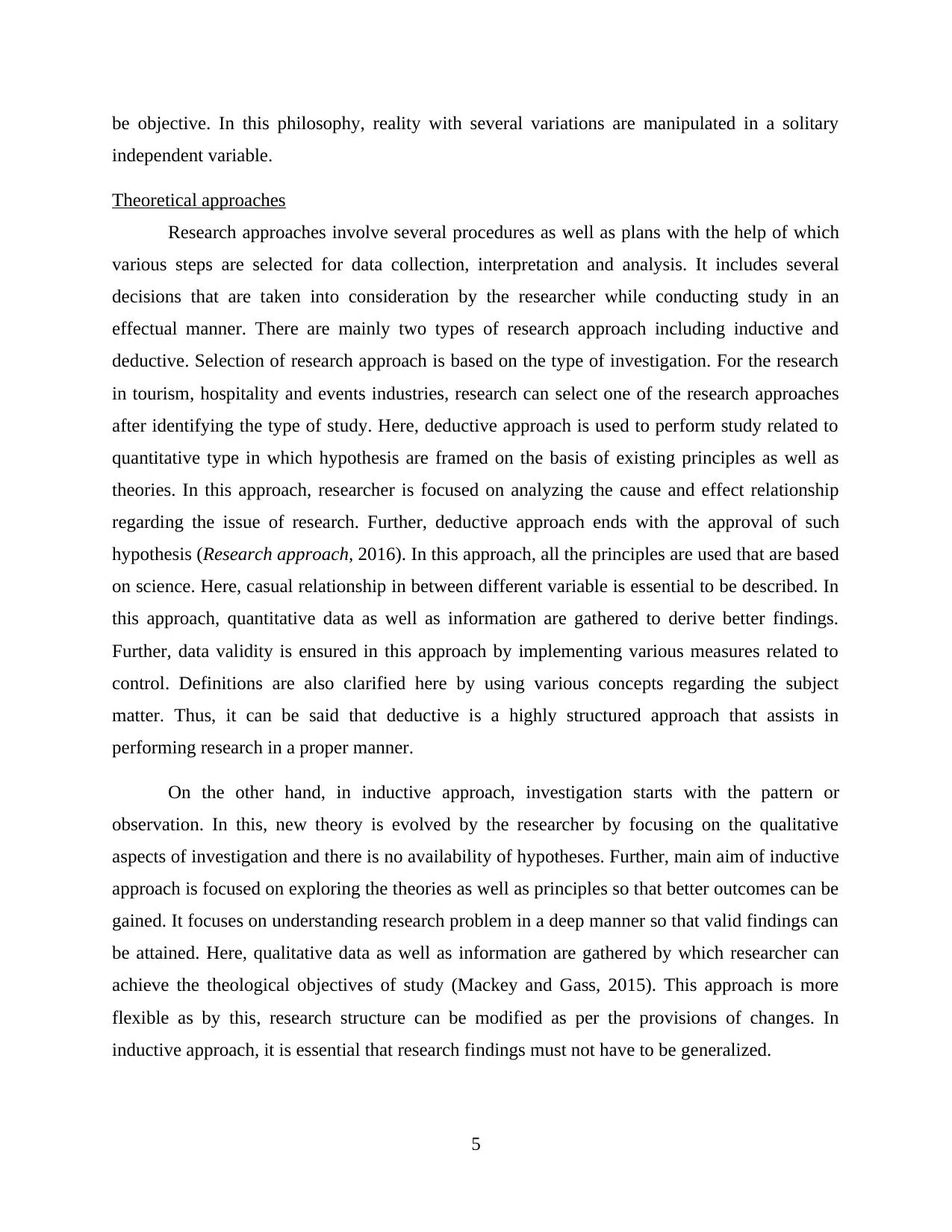
be objective. In this philosophy, reality with several variations are manipulated in a solitary
independent variable.
Theoretical approaches
Research approaches involve several procedures as well as plans with the help of which
various steps are selected for data collection, interpretation and analysis. It includes several
decisions that are taken into consideration by the researcher while conducting study in an
effectual manner. There are mainly two types of research approach including inductive and
deductive. Selection of research approach is based on the type of investigation. For the research
in tourism, hospitality and events industries, research can select one of the research approaches
after identifying the type of study. Here, deductive approach is used to perform study related to
quantitative type in which hypothesis are framed on the basis of existing principles as well as
theories. In this approach, researcher is focused on analyzing the cause and effect relationship
regarding the issue of research. Further, deductive approach ends with the approval of such
hypothesis (Research approach, 2016). In this approach, all the principles are used that are based
on science. Here, casual relationship in between different variable is essential to be described. In
this approach, quantitative data as well as information are gathered to derive better findings.
Further, data validity is ensured in this approach by implementing various measures related to
control. Definitions are also clarified here by using various concepts regarding the subject
matter. Thus, it can be said that deductive is a highly structured approach that assists in
performing research in a proper manner.
On the other hand, in inductive approach, investigation starts with the pattern or
observation. In this, new theory is evolved by the researcher by focusing on the qualitative
aspects of investigation and there is no availability of hypotheses. Further, main aim of inductive
approach is focused on exploring the theories as well as principles so that better outcomes can be
gained. It focuses on understanding research problem in a deep manner so that valid findings can
be attained. Here, qualitative data as well as information are gathered by which researcher can
achieve the theological objectives of study (Mackey and Gass, 2015). This approach is more
flexible as by this, research structure can be modified as per the provisions of changes. In
inductive approach, it is essential that research findings must not have to be generalized.
5
independent variable.
Theoretical approaches
Research approaches involve several procedures as well as plans with the help of which
various steps are selected for data collection, interpretation and analysis. It includes several
decisions that are taken into consideration by the researcher while conducting study in an
effectual manner. There are mainly two types of research approach including inductive and
deductive. Selection of research approach is based on the type of investigation. For the research
in tourism, hospitality and events industries, research can select one of the research approaches
after identifying the type of study. Here, deductive approach is used to perform study related to
quantitative type in which hypothesis are framed on the basis of existing principles as well as
theories. In this approach, researcher is focused on analyzing the cause and effect relationship
regarding the issue of research. Further, deductive approach ends with the approval of such
hypothesis (Research approach, 2016). In this approach, all the principles are used that are based
on science. Here, casual relationship in between different variable is essential to be described. In
this approach, quantitative data as well as information are gathered to derive better findings.
Further, data validity is ensured in this approach by implementing various measures related to
control. Definitions are also clarified here by using various concepts regarding the subject
matter. Thus, it can be said that deductive is a highly structured approach that assists in
performing research in a proper manner.
On the other hand, in inductive approach, investigation starts with the pattern or
observation. In this, new theory is evolved by the researcher by focusing on the qualitative
aspects of investigation and there is no availability of hypotheses. Further, main aim of inductive
approach is focused on exploring the theories as well as principles so that better outcomes can be
gained. It focuses on understanding research problem in a deep manner so that valid findings can
be attained. Here, qualitative data as well as information are gathered by which researcher can
achieve the theological objectives of study (Mackey and Gass, 2015). This approach is more
flexible as by this, research structure can be modified as per the provisions of changes. In
inductive approach, it is essential that research findings must not have to be generalized.
5
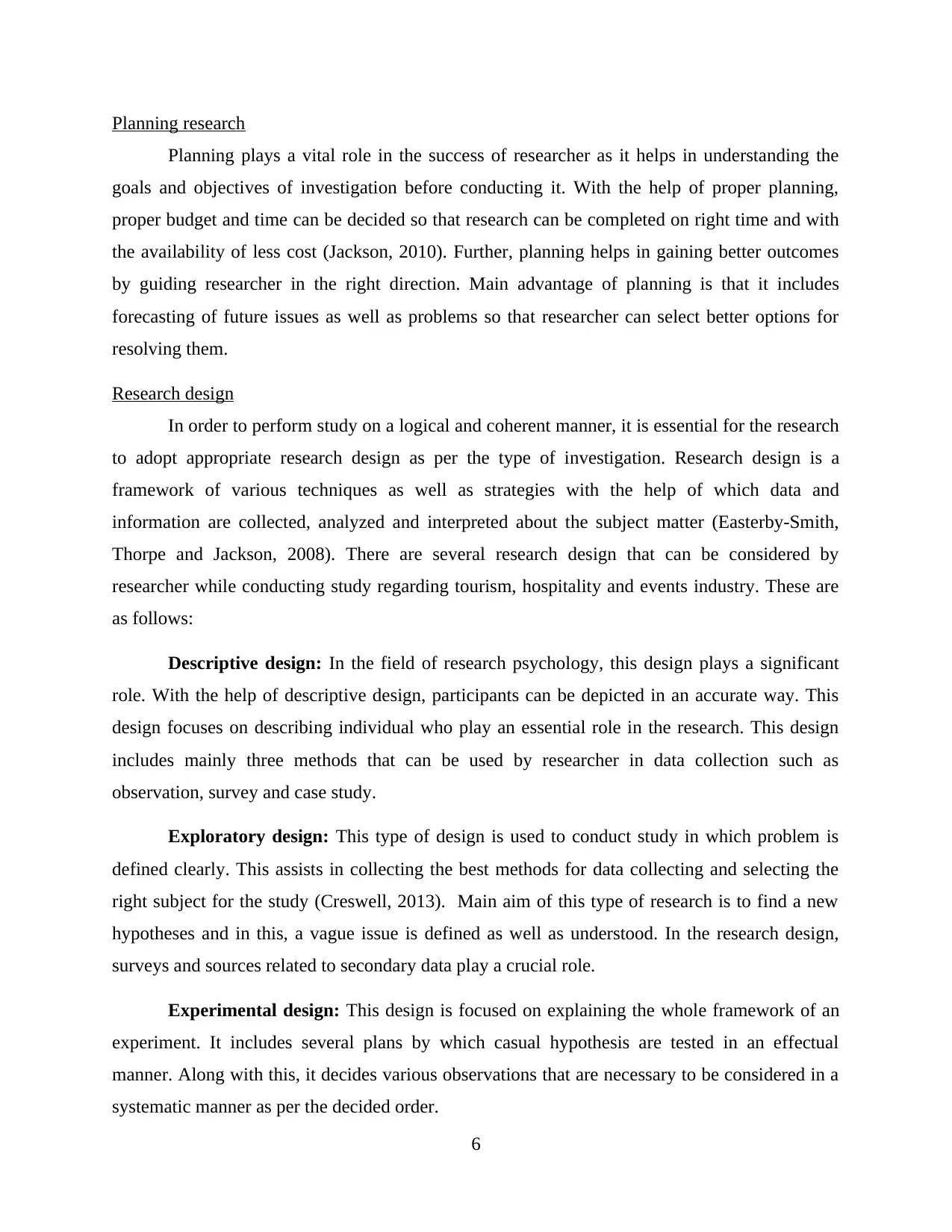
Planning research
Planning plays a vital role in the success of researcher as it helps in understanding the
goals and objectives of investigation before conducting it. With the help of proper planning,
proper budget and time can be decided so that research can be completed on right time and with
the availability of less cost (Jackson, 2010). Further, planning helps in gaining better outcomes
by guiding researcher in the right direction. Main advantage of planning is that it includes
forecasting of future issues as well as problems so that researcher can select better options for
resolving them.
Research design
In order to perform study on a logical and coherent manner, it is essential for the research
to adopt appropriate research design as per the type of investigation. Research design is a
framework of various techniques as well as strategies with the help of which data and
information are collected, analyzed and interpreted about the subject matter (Easterby-Smith,
Thorpe and Jackson, 2008). There are several research design that can be considered by
researcher while conducting study regarding tourism, hospitality and events industry. These are
as follows:
Descriptive design: In the field of research psychology, this design plays a significant
role. With the help of descriptive design, participants can be depicted in an accurate way. This
design focuses on describing individual who play an essential role in the research. This design
includes mainly three methods that can be used by researcher in data collection such as
observation, survey and case study.
Exploratory design: This type of design is used to conduct study in which problem is
defined clearly. This assists in collecting the best methods for data collecting and selecting the
right subject for the study (Creswell, 2013). Main aim of this type of research is to find a new
hypotheses and in this, a vague issue is defined as well as understood. In the research design,
surveys and sources related to secondary data play a crucial role.
Experimental design: This design is focused on explaining the whole framework of an
experiment. It includes several plans by which casual hypothesis are tested in an effectual
manner. Along with this, it decides various observations that are necessary to be considered in a
systematic manner as per the decided order.
6
Planning plays a vital role in the success of researcher as it helps in understanding the
goals and objectives of investigation before conducting it. With the help of proper planning,
proper budget and time can be decided so that research can be completed on right time and with
the availability of less cost (Jackson, 2010). Further, planning helps in gaining better outcomes
by guiding researcher in the right direction. Main advantage of planning is that it includes
forecasting of future issues as well as problems so that researcher can select better options for
resolving them.
Research design
In order to perform study on a logical and coherent manner, it is essential for the research
to adopt appropriate research design as per the type of investigation. Research design is a
framework of various techniques as well as strategies with the help of which data and
information are collected, analyzed and interpreted about the subject matter (Easterby-Smith,
Thorpe and Jackson, 2008). There are several research design that can be considered by
researcher while conducting study regarding tourism, hospitality and events industry. These are
as follows:
Descriptive design: In the field of research psychology, this design plays a significant
role. With the help of descriptive design, participants can be depicted in an accurate way. This
design focuses on describing individual who play an essential role in the research. This design
includes mainly three methods that can be used by researcher in data collection such as
observation, survey and case study.
Exploratory design: This type of design is used to conduct study in which problem is
defined clearly. This assists in collecting the best methods for data collecting and selecting the
right subject for the study (Creswell, 2013). Main aim of this type of research is to find a new
hypotheses and in this, a vague issue is defined as well as understood. In the research design,
surveys and sources related to secondary data play a crucial role.
Experimental design: This design is focused on explaining the whole framework of an
experiment. It includes several plans by which casual hypothesis are tested in an effectual
manner. Along with this, it decides various observations that are necessary to be considered in a
systematic manner as per the decided order.
6
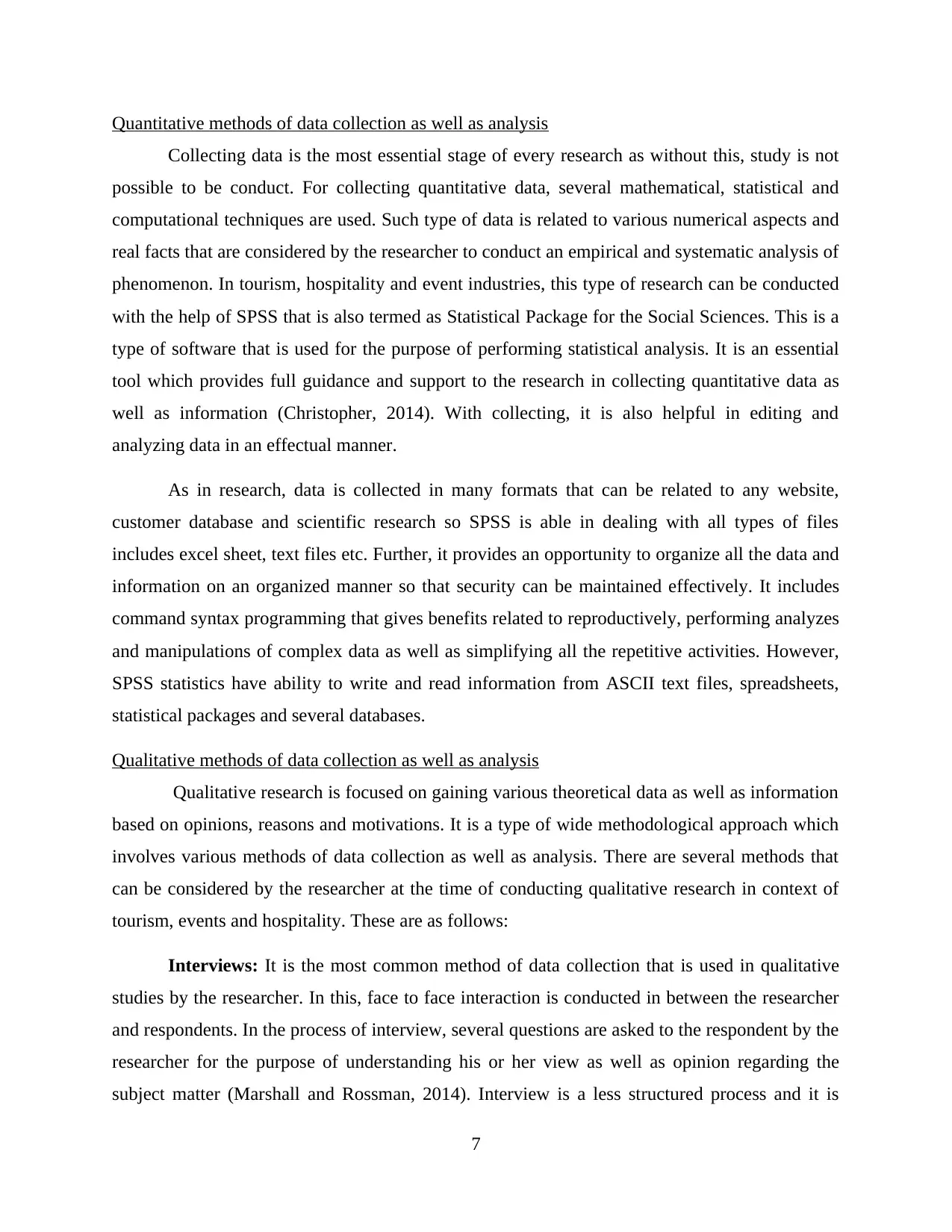
Quantitative methods of data collection as well as analysis
Collecting data is the most essential stage of every research as without this, study is not
possible to be conduct. For collecting quantitative data, several mathematical, statistical and
computational techniques are used. Such type of data is related to various numerical aspects and
real facts that are considered by the researcher to conduct an empirical and systematic analysis of
phenomenon. In tourism, hospitality and event industries, this type of research can be conducted
with the help of SPSS that is also termed as Statistical Package for the Social Sciences. This is a
type of software that is used for the purpose of performing statistical analysis. It is an essential
tool which provides full guidance and support to the research in collecting quantitative data as
well as information (Christopher, 2014). With collecting, it is also helpful in editing and
analyzing data in an effectual manner.
As in research, data is collected in many formats that can be related to any website,
customer database and scientific research so SPSS is able in dealing with all types of files
includes excel sheet, text files etc. Further, it provides an opportunity to organize all the data and
information on an organized manner so that security can be maintained effectively. It includes
command syntax programming that gives benefits related to reproductively, performing analyzes
and manipulations of complex data as well as simplifying all the repetitive activities. However,
SPSS statistics have ability to write and read information from ASCII text files, spreadsheets,
statistical packages and several databases.
Qualitative methods of data collection as well as analysis
Qualitative research is focused on gaining various theoretical data as well as information
based on opinions, reasons and motivations. It is a type of wide methodological approach which
involves various methods of data collection as well as analysis. There are several methods that
can be considered by the researcher at the time of conducting qualitative research in context of
tourism, events and hospitality. These are as follows:
Interviews: It is the most common method of data collection that is used in qualitative
studies by the researcher. In this, face to face interaction is conducted in between the researcher
and respondents. In the process of interview, several questions are asked to the respondent by the
researcher for the purpose of understanding his or her view as well as opinion regarding the
subject matter (Marshall and Rossman, 2014). Interview is a less structured process and it is
7
Collecting data is the most essential stage of every research as without this, study is not
possible to be conduct. For collecting quantitative data, several mathematical, statistical and
computational techniques are used. Such type of data is related to various numerical aspects and
real facts that are considered by the researcher to conduct an empirical and systematic analysis of
phenomenon. In tourism, hospitality and event industries, this type of research can be conducted
with the help of SPSS that is also termed as Statistical Package for the Social Sciences. This is a
type of software that is used for the purpose of performing statistical analysis. It is an essential
tool which provides full guidance and support to the research in collecting quantitative data as
well as information (Christopher, 2014). With collecting, it is also helpful in editing and
analyzing data in an effectual manner.
As in research, data is collected in many formats that can be related to any website,
customer database and scientific research so SPSS is able in dealing with all types of files
includes excel sheet, text files etc. Further, it provides an opportunity to organize all the data and
information on an organized manner so that security can be maintained effectively. It includes
command syntax programming that gives benefits related to reproductively, performing analyzes
and manipulations of complex data as well as simplifying all the repetitive activities. However,
SPSS statistics have ability to write and read information from ASCII text files, spreadsheets,
statistical packages and several databases.
Qualitative methods of data collection as well as analysis
Qualitative research is focused on gaining various theoretical data as well as information
based on opinions, reasons and motivations. It is a type of wide methodological approach which
involves various methods of data collection as well as analysis. There are several methods that
can be considered by the researcher at the time of conducting qualitative research in context of
tourism, events and hospitality. These are as follows:
Interviews: It is the most common method of data collection that is used in qualitative
studies by the researcher. In this, face to face interaction is conducted in between the researcher
and respondents. In the process of interview, several questions are asked to the respondent by the
researcher for the purpose of understanding his or her view as well as opinion regarding the
subject matter (Marshall and Rossman, 2014). Interview is a less structured process and it is
7
Paraphrase This Document
Need a fresh take? Get an instant paraphrase of this document with our AI Paraphraser
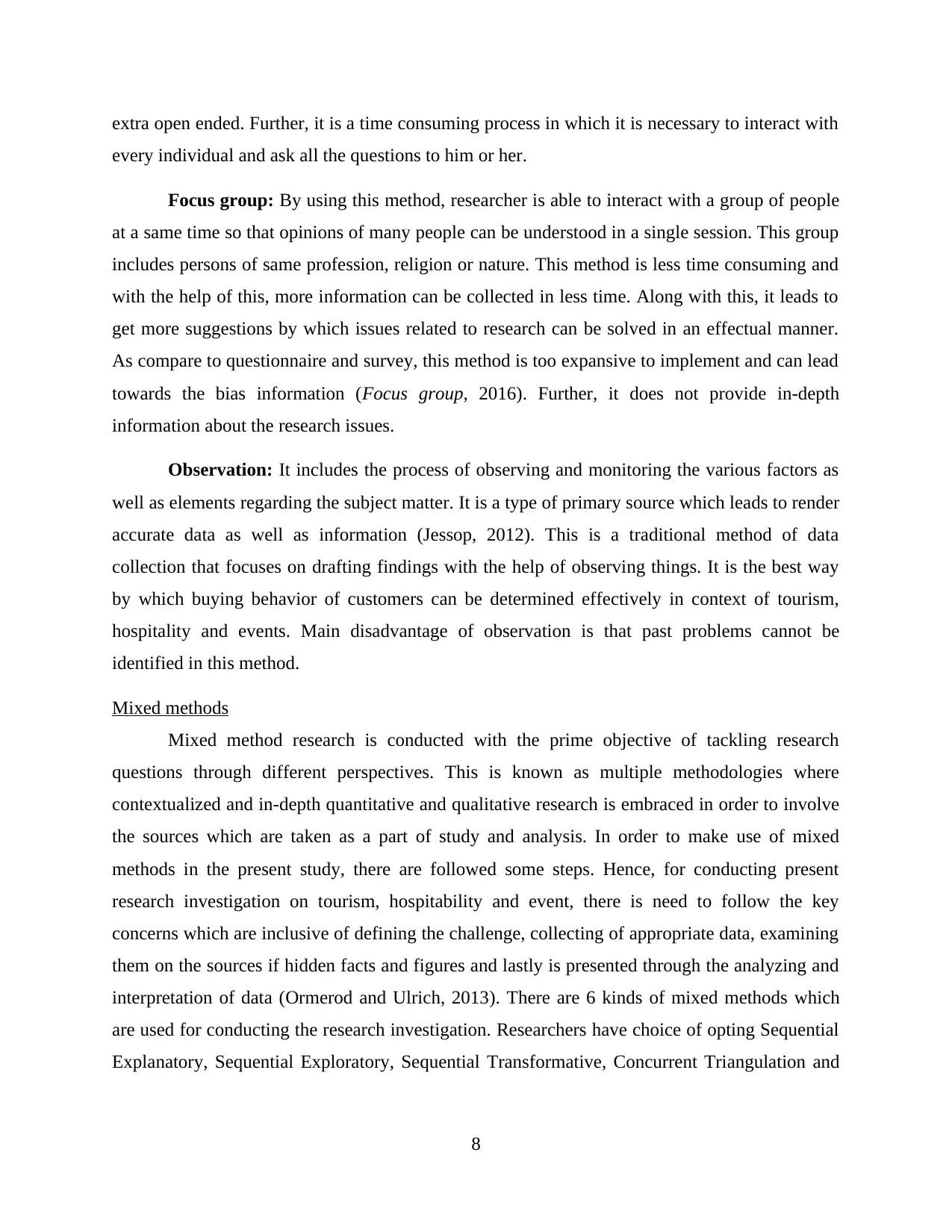
extra open ended. Further, it is a time consuming process in which it is necessary to interact with
every individual and ask all the questions to him or her.
Focus group: By using this method, researcher is able to interact with a group of people
at a same time so that opinions of many people can be understood in a single session. This group
includes persons of same profession, religion or nature. This method is less time consuming and
with the help of this, more information can be collected in less time. Along with this, it leads to
get more suggestions by which issues related to research can be solved in an effectual manner.
As compare to questionnaire and survey, this method is too expansive to implement and can lead
towards the bias information (Focus group, 2016). Further, it does not provide in-depth
information about the research issues.
Observation: It includes the process of observing and monitoring the various factors as
well as elements regarding the subject matter. It is a type of primary source which leads to render
accurate data as well as information (Jessop, 2012). This is a traditional method of data
collection that focuses on drafting findings with the help of observing things. It is the best way
by which buying behavior of customers can be determined effectively in context of tourism,
hospitality and events. Main disadvantage of observation is that past problems cannot be
identified in this method.
Mixed methods
Mixed method research is conducted with the prime objective of tackling research
questions through different perspectives. This is known as multiple methodologies where
contextualized and in-depth quantitative and qualitative research is embraced in order to involve
the sources which are taken as a part of study and analysis. In order to make use of mixed
methods in the present study, there are followed some steps. Hence, for conducting present
research investigation on tourism, hospitability and event, there is need to follow the key
concerns which are inclusive of defining the challenge, collecting of appropriate data, examining
them on the sources if hidden facts and figures and lastly is presented through the analyzing and
interpretation of data (Ormerod and Ulrich, 2013). There are 6 kinds of mixed methods which
are used for conducting the research investigation. Researchers have choice of opting Sequential
Explanatory, Sequential Exploratory, Sequential Transformative, Concurrent Triangulation and
8
every individual and ask all the questions to him or her.
Focus group: By using this method, researcher is able to interact with a group of people
at a same time so that opinions of many people can be understood in a single session. This group
includes persons of same profession, religion or nature. This method is less time consuming and
with the help of this, more information can be collected in less time. Along with this, it leads to
get more suggestions by which issues related to research can be solved in an effectual manner.
As compare to questionnaire and survey, this method is too expansive to implement and can lead
towards the bias information (Focus group, 2016). Further, it does not provide in-depth
information about the research issues.
Observation: It includes the process of observing and monitoring the various factors as
well as elements regarding the subject matter. It is a type of primary source which leads to render
accurate data as well as information (Jessop, 2012). This is a traditional method of data
collection that focuses on drafting findings with the help of observing things. It is the best way
by which buying behavior of customers can be determined effectively in context of tourism,
hospitality and events. Main disadvantage of observation is that past problems cannot be
identified in this method.
Mixed methods
Mixed method research is conducted with the prime objective of tackling research
questions through different perspectives. This is known as multiple methodologies where
contextualized and in-depth quantitative and qualitative research is embraced in order to involve
the sources which are taken as a part of study and analysis. In order to make use of mixed
methods in the present study, there are followed some steps. Hence, for conducting present
research investigation on tourism, hospitability and event, there is need to follow the key
concerns which are inclusive of defining the challenge, collecting of appropriate data, examining
them on the sources if hidden facts and figures and lastly is presented through the analyzing and
interpretation of data (Ormerod and Ulrich, 2013). There are 6 kinds of mixed methods which
are used for conducting the research investigation. Researchers have choice of opting Sequential
Explanatory, Sequential Exploratory, Sequential Transformative, Concurrent Triangulation and
8
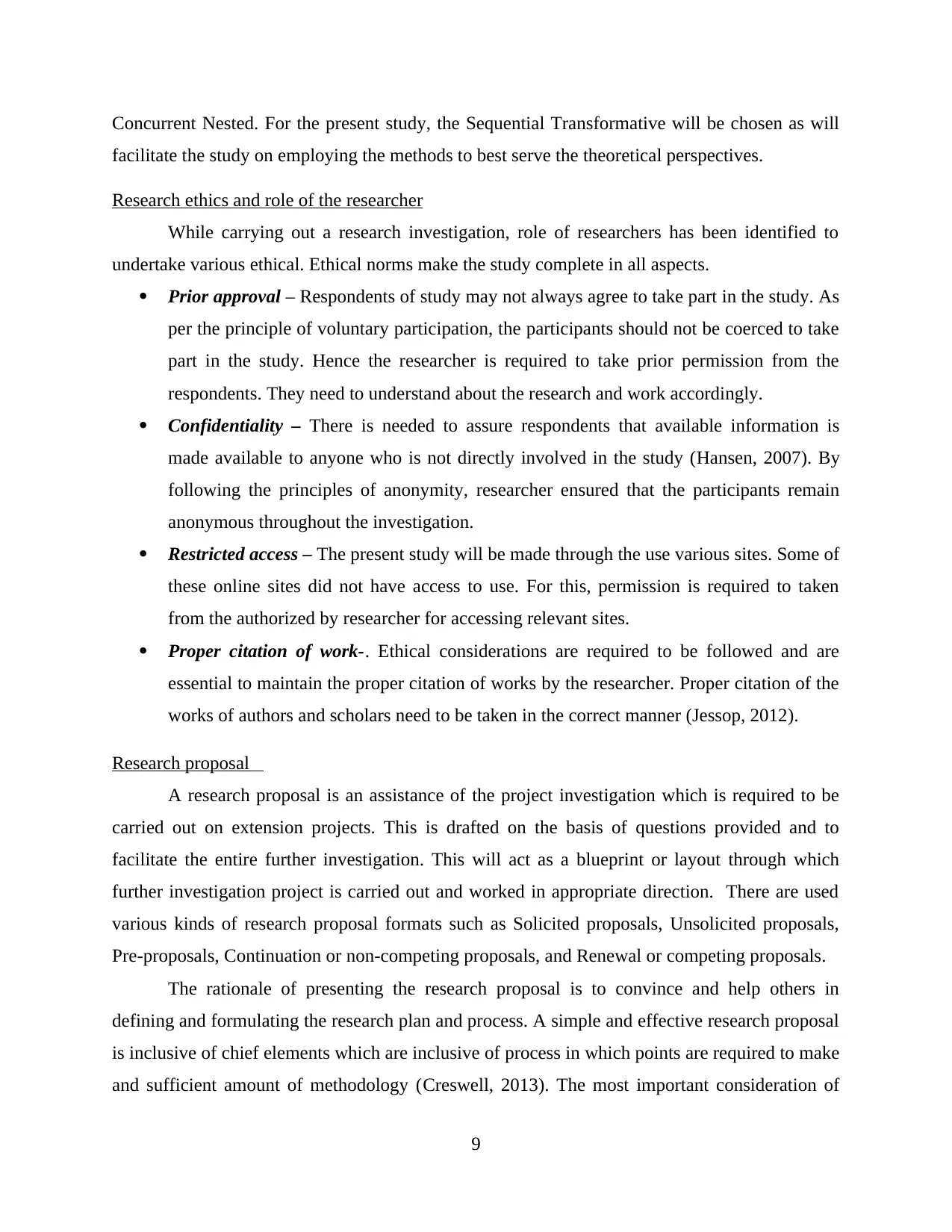
Concurrent Nested. For the present study, the Sequential Transformative will be chosen as will
facilitate the study on employing the methods to best serve the theoretical perspectives.
Research ethics and role of the researcher
While carrying out a research investigation, role of researchers has been identified to
undertake various ethical. Ethical norms make the study complete in all aspects.
Prior approval – Respondents of study may not always agree to take part in the study. As
per the principle of voluntary participation, the participants should not be coerced to take
part in the study. Hence the researcher is required to take prior permission from the
respondents. They need to understand about the research and work accordingly.
Confidentiality – There is needed to assure respondents that available information is
made available to anyone who is not directly involved in the study (Hansen, 2007). By
following the principles of anonymity, researcher ensured that the participants remain
anonymous throughout the investigation.
Restricted access – The present study will be made through the use various sites. Some of
these online sites did not have access to use. For this, permission is required to taken
from the authorized by researcher for accessing relevant sites.
Proper citation of work-. Ethical considerations are required to be followed and are
essential to maintain the proper citation of works by the researcher. Proper citation of the
works of authors and scholars need to be taken in the correct manner (Jessop, 2012).
Research proposal
A research proposal is an assistance of the project investigation which is required to be
carried out on extension projects. This is drafted on the basis of questions provided and to
facilitate the entire further investigation. This will act as a blueprint or layout through which
further investigation project is carried out and worked in appropriate direction. There are used
various kinds of research proposal formats such as Solicited proposals, Unsolicited proposals,
Pre-proposals, Continuation or non-competing proposals, and Renewal or competing proposals.
The rationale of presenting the research proposal is to convince and help others in
defining and formulating the research plan and process. A simple and effective research proposal
is inclusive of chief elements which are inclusive of process in which points are required to make
and sufficient amount of methodology (Creswell, 2013). The most important consideration of
9
facilitate the study on employing the methods to best serve the theoretical perspectives.
Research ethics and role of the researcher
While carrying out a research investigation, role of researchers has been identified to
undertake various ethical. Ethical norms make the study complete in all aspects.
Prior approval – Respondents of study may not always agree to take part in the study. As
per the principle of voluntary participation, the participants should not be coerced to take
part in the study. Hence the researcher is required to take prior permission from the
respondents. They need to understand about the research and work accordingly.
Confidentiality – There is needed to assure respondents that available information is
made available to anyone who is not directly involved in the study (Hansen, 2007). By
following the principles of anonymity, researcher ensured that the participants remain
anonymous throughout the investigation.
Restricted access – The present study will be made through the use various sites. Some of
these online sites did not have access to use. For this, permission is required to taken
from the authorized by researcher for accessing relevant sites.
Proper citation of work-. Ethical considerations are required to be followed and are
essential to maintain the proper citation of works by the researcher. Proper citation of the
works of authors and scholars need to be taken in the correct manner (Jessop, 2012).
Research proposal
A research proposal is an assistance of the project investigation which is required to be
carried out on extension projects. This is drafted on the basis of questions provided and to
facilitate the entire further investigation. This will act as a blueprint or layout through which
further investigation project is carried out and worked in appropriate direction. There are used
various kinds of research proposal formats such as Solicited proposals, Unsolicited proposals,
Pre-proposals, Continuation or non-competing proposals, and Renewal or competing proposals.
The rationale of presenting the research proposal is to convince and help others in
defining and formulating the research plan and process. A simple and effective research proposal
is inclusive of chief elements which are inclusive of process in which points are required to make
and sufficient amount of methodology (Creswell, 2013). The most important consideration of
9
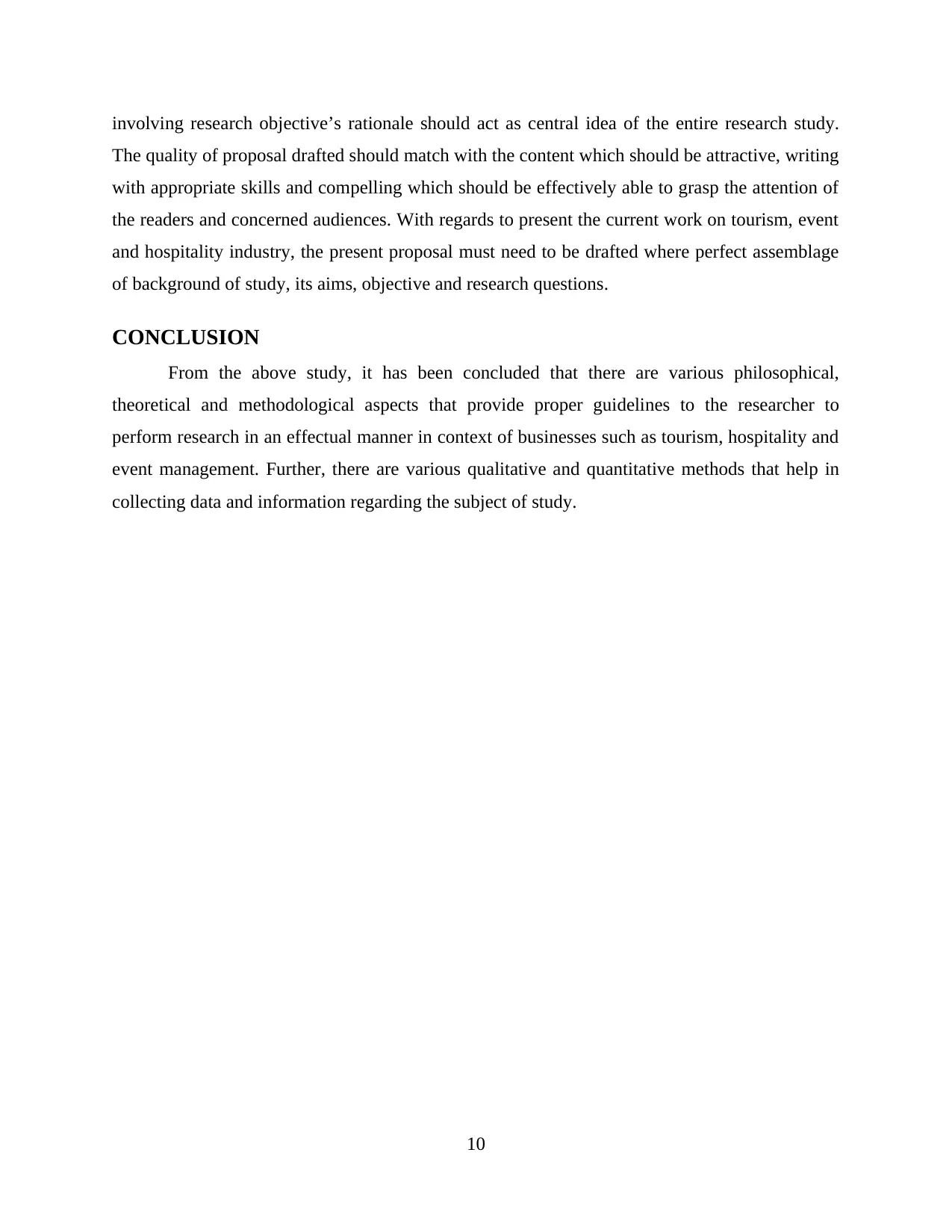
involving research objective’s rationale should act as central idea of the entire research study.
The quality of proposal drafted should match with the content which should be attractive, writing
with appropriate skills and compelling which should be effectively able to grasp the attention of
the readers and concerned audiences. With regards to present the current work on tourism, event
and hospitality industry, the present proposal must need to be drafted where perfect assemblage
of background of study, its aims, objective and research questions.
CONCLUSION
From the above study, it has been concluded that there are various philosophical,
theoretical and methodological aspects that provide proper guidelines to the researcher to
perform research in an effectual manner in context of businesses such as tourism, hospitality and
event management. Further, there are various qualitative and quantitative methods that help in
collecting data and information regarding the subject of study.
10
The quality of proposal drafted should match with the content which should be attractive, writing
with appropriate skills and compelling which should be effectively able to grasp the attention of
the readers and concerned audiences. With regards to present the current work on tourism, event
and hospitality industry, the present proposal must need to be drafted where perfect assemblage
of background of study, its aims, objective and research questions.
CONCLUSION
From the above study, it has been concluded that there are various philosophical,
theoretical and methodological aspects that provide proper guidelines to the researcher to
perform research in an effectual manner in context of businesses such as tourism, hospitality and
event management. Further, there are various qualitative and quantitative methods that help in
collecting data and information regarding the subject of study.
10
Secure Best Marks with AI Grader
Need help grading? Try our AI Grader for instant feedback on your assignments.
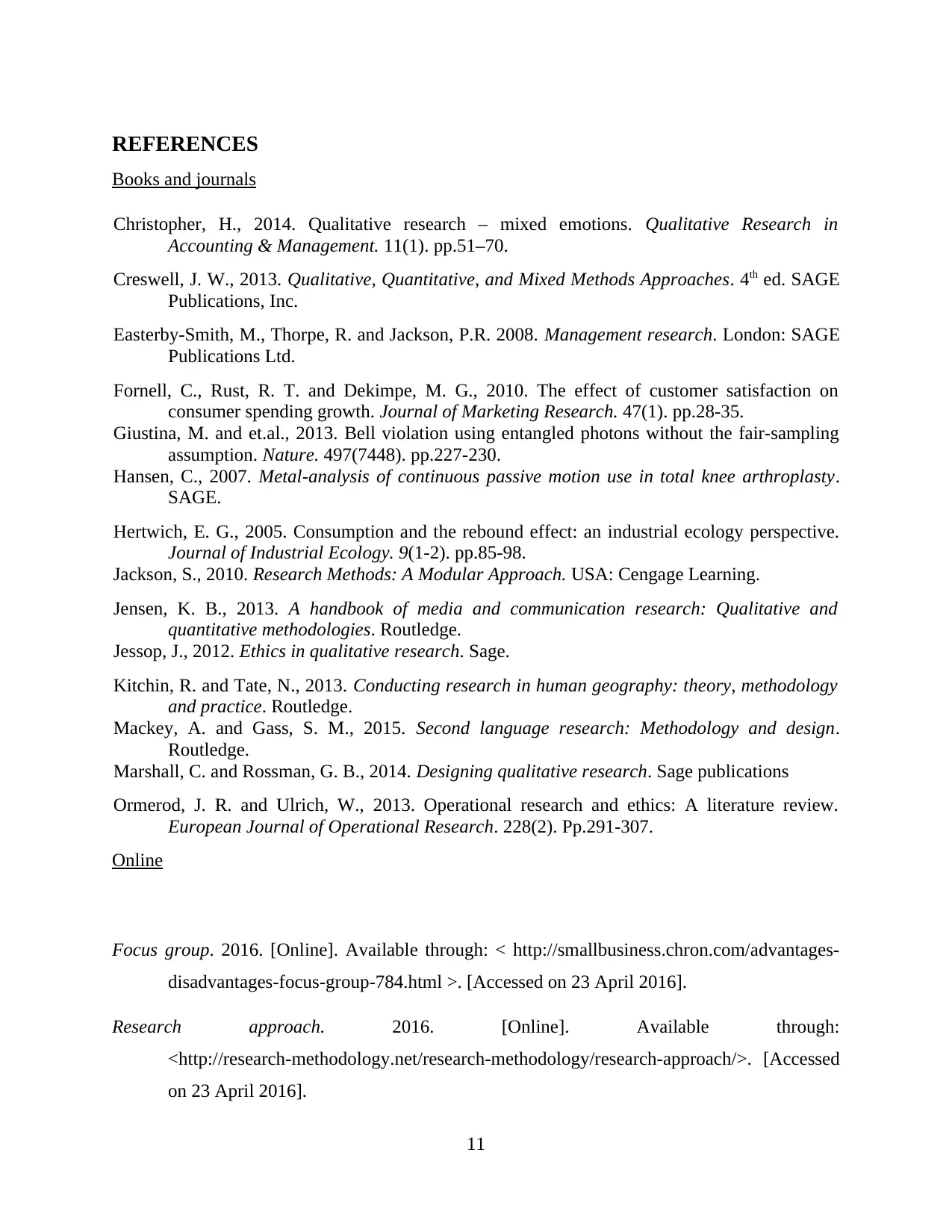
REFERENCES
Books and journals
Christopher, H., 2014. Qualitative research – mixed emotions. Qualitative Research in
Accounting & Management. 11(1). pp.51–70.
Creswell, J. W., 2013. Qualitative, Quantitative, and Mixed Methods Approaches. 4th ed. SAGE
Publications, Inc.
Easterby-Smith, M., Thorpe, R. and Jackson, P.R. 2008. Management research. London: SAGE
Publications Ltd.
Fornell, C., Rust, R. T. and Dekimpe, M. G., 2010. The effect of customer satisfaction on
consumer spending growth. Journal of Marketing Research. 47(1). pp.28-35.
Giustina, M. and et.al., 2013. Bell violation using entangled photons without the fair-sampling
assumption. Nature. 497(7448). pp.227-230.
Hansen, C., 2007. Metal-analysis of continuous passive motion use in total knee arthroplasty.
SAGE.
Hertwich, E. G., 2005. Consumption and the rebound effect: an industrial ecology perspective.
Journal of Industrial Ecology. 9(1‐2). pp.85-98.
Jackson, S., 2010. Research Methods: A Modular Approach. USA: Cengage Learning.
Jensen, K. B., 2013. A handbook of media and communication research: Qualitative and
quantitative methodologies. Routledge.
Jessop, J., 2012. Ethics in qualitative research. Sage.
Kitchin, R. and Tate, N., 2013. Conducting research in human geography: theory, methodology
and practice. Routledge.
Mackey, A. and Gass, S. M., 2015. Second language research: Methodology and design.
Routledge.
Marshall, C. and Rossman, G. B., 2014. Designing qualitative research. Sage publications
Ormerod, J. R. and Ulrich, W., 2013. Operational research and ethics: A literature review.
European Journal of Operational Research. 228(2). Pp.291-307.
Online
Focus group. 2016. [Online]. Available through: < http://smallbusiness.chron.com/advantages-
disadvantages-focus-group-784.html >. [Accessed on 23 April 2016].
Research approach. 2016. [Online]. Available through:
<http://research-methodology.net/research-methodology/research-approach/>. [Accessed
on 23 April 2016].
11
Books and journals
Christopher, H., 2014. Qualitative research – mixed emotions. Qualitative Research in
Accounting & Management. 11(1). pp.51–70.
Creswell, J. W., 2013. Qualitative, Quantitative, and Mixed Methods Approaches. 4th ed. SAGE
Publications, Inc.
Easterby-Smith, M., Thorpe, R. and Jackson, P.R. 2008. Management research. London: SAGE
Publications Ltd.
Fornell, C., Rust, R. T. and Dekimpe, M. G., 2010. The effect of customer satisfaction on
consumer spending growth. Journal of Marketing Research. 47(1). pp.28-35.
Giustina, M. and et.al., 2013. Bell violation using entangled photons without the fair-sampling
assumption. Nature. 497(7448). pp.227-230.
Hansen, C., 2007. Metal-analysis of continuous passive motion use in total knee arthroplasty.
SAGE.
Hertwich, E. G., 2005. Consumption and the rebound effect: an industrial ecology perspective.
Journal of Industrial Ecology. 9(1‐2). pp.85-98.
Jackson, S., 2010. Research Methods: A Modular Approach. USA: Cengage Learning.
Jensen, K. B., 2013. A handbook of media and communication research: Qualitative and
quantitative methodologies. Routledge.
Jessop, J., 2012. Ethics in qualitative research. Sage.
Kitchin, R. and Tate, N., 2013. Conducting research in human geography: theory, methodology
and practice. Routledge.
Mackey, A. and Gass, S. M., 2015. Second language research: Methodology and design.
Routledge.
Marshall, C. and Rossman, G. B., 2014. Designing qualitative research. Sage publications
Ormerod, J. R. and Ulrich, W., 2013. Operational research and ethics: A literature review.
European Journal of Operational Research. 228(2). Pp.291-307.
Online
Focus group. 2016. [Online]. Available through: < http://smallbusiness.chron.com/advantages-
disadvantages-focus-group-784.html >. [Accessed on 23 April 2016].
Research approach. 2016. [Online]. Available through:
<http://research-methodology.net/research-methodology/research-approach/>. [Accessed
on 23 April 2016].
11
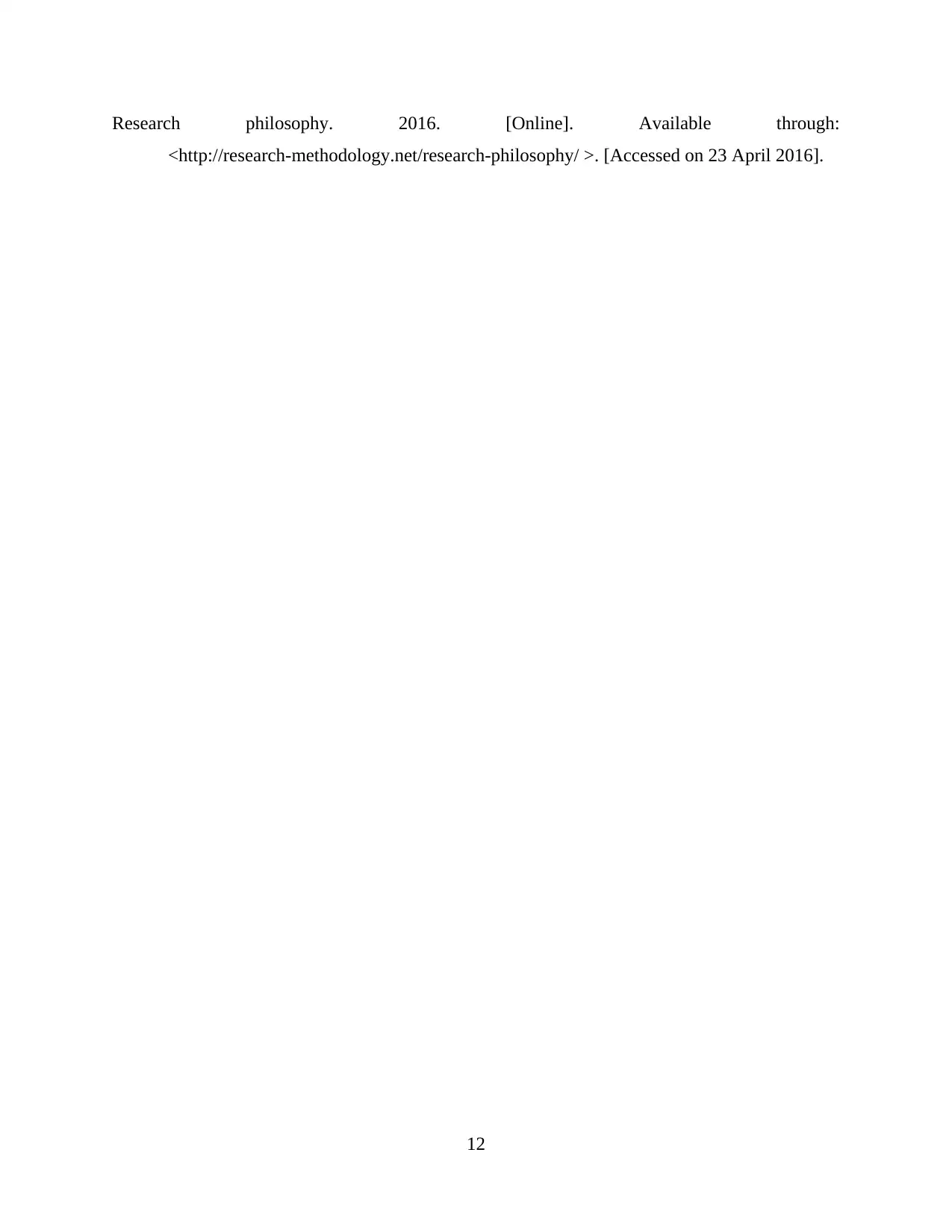
Research philosophy. 2016. [Online]. Available through:
<http://research-methodology.net/research-philosophy/ >. [Accessed on 23 April 2016].
12
<http://research-methodology.net/research-philosophy/ >. [Accessed on 23 April 2016].
12
1 out of 12
Your All-in-One AI-Powered Toolkit for Academic Success.
+13062052269
info@desklib.com
Available 24*7 on WhatsApp / Email
![[object Object]](/_next/static/media/star-bottom.7253800d.svg)
Unlock your academic potential
© 2024 | Zucol Services PVT LTD | All rights reserved.





